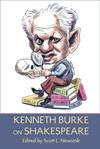Kenneth Burke on Shakespeare, by Scott Newstok
 Newstok, Scott L., ed. Kenneth Burke on Shakespeare. West Lafayette, IN: Parlor Press, 2007. lv + 308 pp.
Newstok, Scott L., ed. Kenneth Burke on Shakespeare. West Lafayette, IN: Parlor Press, 2007. lv + 308 pp.
Reviewed by Andrew Battista, University of Kentucky
In a recent Times Literary Supplement commentary, Peter Holbrook speculates why Kenneth Burke, once a “hip literary intellectual,” has since been removed from academia’s tightly-policed list of influential critics. Holbrook argues that Burke’s novelty as a literary critic and rhetorical theorist has all but dissipated in today’s intellectual milieu, where Burke’s insights have “become the shopworn stock of literary and cultural study everywhere.” Basically, Burke is old news. As Holbrook sings his swan song, he also has some unsavory things to say about Burke as a stylist and thinker. Burke is, in Holbrook’s view, a disengaged critic whose prose betrays him as a “woefully slapdash and charmless writer,” a theorist whose ideas are exceedingly “thick with the fumes of a proliferating and autogenic terminology” while lacking a clear import or sense of urgency (11-12).
However, even as he dismantles Burke, Holbrook would admit that Burke’s more innovative and lucid moments come when he engages the works of William Shakespeare, the playwright who provides Burke with ideal texts to explicate his notion of Dramatism. We know from one of Burke’s foremost expositors, William Rueckert, that Burke entertained the idea of publishing a volume of his own work on Shakespeare, but such a project never came to fruition during Burke’s life (266). Thankfully, now we have Kenneth Burke on Shakespeare, a collection edited by Scott L. Newstok that compiles the entirety of Burke’s writings on Shakespeare, including three previously unpublished lectures.
The most valuable of these, Burke’s talk, “Introduction: Shakespeare Was What?,” serves as a useful primer to Burke’s system of reading Shakespeare. As the lecture establishes, Burke is ultimately concerned with what literature does (i.e. how it functions). Accordingly, Shakespeare is, in Burke’s mind, an artist who “spontaneously knew how to translate some typical tension or conflict of his society into terms of variously interrelated personalities.” As Burke explains, Shakespeare’s ability “was to let that whole complexity act itself out, by endowing each personality with the appropriate ideas, attitudes, actions, situations, relationships, and fatality” (18). Shakespeare, above all other dramatists, constructs plays in which his characters’ engagements with each other constitute the play’s movement while dictating meaning to its audience. And Burke, perhaps above all other critics, articulates the anatomy of these engagements for us.
Newstok places Burke’s “Introduction” before the essays on the individual plays in the volume, and he directs the uninitiated reader to digest Burke’s lecture before tackling the extended meditations that follow it. Newstok also prefaces the volume with an extremely well-written introduction that not only contextualizes Burke as a literary critic and Shakespearian, but also provides a Dramatis Personae, a guide to the sometimes-foreign Burkean nomenclature that undergirds his readings. Those encountering Burke for the first time will benefit from Newstok’s accessible delineation of central Burkean concepts, like “entelechy,” “ritual,” and “paradox of substance.” Newstok’s introduction not only offers a primer to the essays at hand, but also provides a useful situating of Burke as a “maverick intellectual” (xvii) who often tested the stylistic conventions of literary criticism in the American academy and who always remained aloof from the mainstream establishment.
The highlights of Kenneth Burke on Shakespeare include its essay on Julius Caesar, in which Burke ventriloquizes the oft-repeated “Friends, Romans, Countrymen” speech, surely one example of his ability to reshape the form of academic criticism; and Burke’s explication of Othello, which Newstok calls “by far [Burke’s] most ambitious contribution to Shakespeare studies” (xxvi). In this essay, held as a model that illustrates his method, Burke systematically explicates how the tragedy functions. Throughout Othello, Burke argues, Iago serves as an impresario, goading “the plot forward step by step, for the audience’s villainous entertainment and filthy purgation” (69-70).
Newstok edits with great scrupulousness, and the information concerning the textual origins of Burke’s writing far exceeds what one would expect in such a volume. Newstok provides ample rationale for his editorial decisions, useful information on each essay’s original publication, and generally helpful references to Burke’s allusions to Shakespeare. Unfortunately, though, many of Newstok’s endnotes, which aim to make Burke’s criticism accessible to scholars and general readers alike, verge on being obtrusive. For instance, when Burke makes a reference to Plato, it’s somewhat frustrating to flip back to the endnotes and read that Plato (c. 427 BCE—c. 347 BCE) was a Greek philosopher (267). To be fair, Newstok acknowledges the quandary of annotating for multiple audiences, and he warns that many of his endnotes will be “comically redundant for some” and still “not enough information for others” (liii). Regardless, in many instances it’s hard to imagine who these others might be.
Nonetheless, Burke scholars will find Newstok’s compilation of additional references to Shakespeare invaluable. While the sections that Newstok provides can’t possibly offer full context, the well-versed Burkean will certainly have the texts in question (A Grammar of Motives, Attitudes Toward History, and so on) at hand. An impressive piece of scholarship, Kenneth Burke on Shakespeare will prove to be an essential work for a variety of audiences, including Shakespearians and Burkeans.
Works Cited
Holbrook, Peter. “What Happened to Burke? How a Lionized American Critic, for Whom Literature was ‘Equipment for Living,’ Became Lost to Posterity.” Times Literary Supplement 13 July 2007: 11-12.
Rueckert, William. Kenneth Burke and the Drama of Human Relations. 2nd ed. Berkeley: University of California Press, 1982.
- 34191 reads